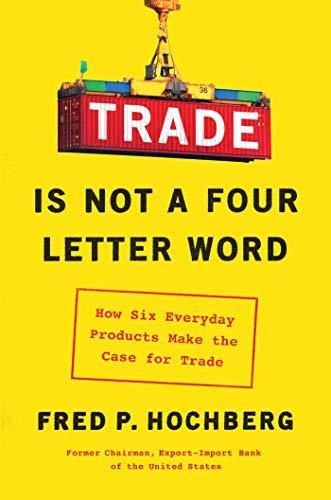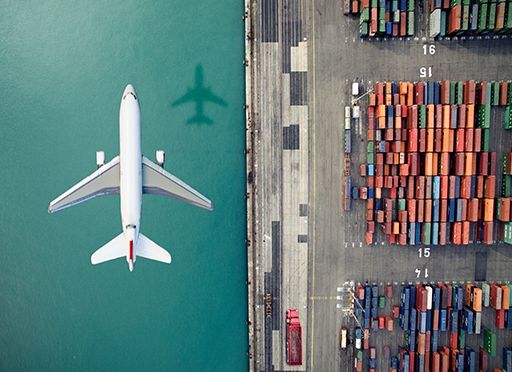Former chairman of the Export-Import Bank Fred Hochberg brings an unexpected sense of humor to this surprisingly engaging breakdown of international trade and its consequences for the US consumer.

A Different Perspective on Global Trade
If anyone should know and understand trade, Fred P. Hochberg – chairman and president of the Export-Import Bank of the United States from 2009 to 2017 – heads the list. In his engaging study, this true believer in trade sings the praises of the flow of international goods and explains the relevance of supply chains. Hochberg acknowledges the potential for economic pain with globalization, but he makes a compelling case that trade deficits simply don’t matter.
Industry leaders and finance-oriented news media admire Hochberg’s perceptions. Frederick W. Smith, FedEx founder and CEO – and thus a man whose profits, in large part, depend on trade – said, “Written by a uniquely qualified expert, this is a witty, enjoyable book that makes clear the great benefits – but difficult politics and policy choices – of international trade.” The Financial Times found Hochberg’s writing ”timely [and] engaging,” and The Wall Street Journal called his book “a sprightly and clear-eyed testimonial to the value of globalization.” Reviewers agree that Hochberg brings a humorous, illuminating and uniquely informal voice to trade discussions.
For those seeking greater knowledge of international trade and globalization, worthy ancillary reads include The Great Reversal by Thomas Philippon and Abhijit V. Banerjee and Esther Duflo’s Good Economics for Hard Times.
Trade
Hochberg leads with his central thesis: What US consumers buy and the prices they pay depend on global supply chains and international trade policy. Trade, he notes, brings trade-offs.
President Donald Trump claimed that he aggressively imposed tariffs to protect US jobs. The author insists that the true effect of those tariffs is a tax on US consumers and higher prices for imported products. Hochberg states plainly that no one knows how many jobs any trade agreement creates or destroys. Another of his themes is that modern economies are so complex and multifaceted that no one can accurately measure trade’s effects.
Trade Deficits
A trade deficit, the author explains, means that a country imports goods with a total value higher than that of its exported goods. Beyond that, the figure is meaningless, and Hochberg is adamant that trade gaps are never a useful or revealing metric.
It’s hard to blame a person – any person – who knows little about trade for hearing the term ‘trade deficit’ and assuming that it equates to lost money.
Fred P. Hochberg
If Americans had to subsist on only made-in-the-USA products, the author argues, iPhones and laptops would be unavailable and common products madly expensive.
Taco Salad
Hochberg dissects the taco salad as a metaphor. At one time, he says, it included Iowa corn, Montana beef and California tomatoes. Today, the author reports, the corn is Romanian, the tomatoes Mexican and the onions Peruvian. The point of the author’s metaphor? Robust global markets mean consumers have broad choices for goods.
“Foreign” Cars Aren’t
For all the political talk about imported cars, Hochberg avows that the “most American” car on US roads is the Honda Odyssey: Its assembly takes place in Alabama, and three-quarters of its content comes from the United States or Canada. Hochberg revels in the fact that the Mercedes C-Class is more American than the Chevrolet Corvette.
That patriotic impulse to buy American is a mile wide, but it may also be an inch deep. Fred P. Hochberg
Manufacturing supply chains have evolved. Asian and European manufacturers maintain factories in the United States, meaning, the author recognizes, that American workers make cars with foreign nameplates. Hochberg says this helps explain why tariffs are counterproductive. For example, Hochberg laments layoffs at a nail producer in Missouri and at Harley-Davidson after Trump imposed steel tariffs in 2018. The tariffs forced a $2,200 increase in the cost of every Harley sold in Europe, so the company shifted US jobs overseas.
Oranges
Hochberg presents the trade in oranges as a success story that illustrates the dangers of limiting the flow of goods. He recounts how Hurricane Irma in 2017 wiped out half of Florida’s orange crop, dramatically raising prices for Florida orange juice. The author notes that Brazilian farmers stepped up; now orange juice is more likely to come from South America than Florida. If the United States, Hochberg warns, suddenly closed its borders to Brazilian oranges, they would become a luxury item. Again, the author uses this example to teach US readers the depth of their dependence on global trade.
The iPhone
Hochberg regards the iPhone as the most global product on the market. He cites commentator Thomas Friedman’s argument that nations won’t wage war if global supply chains connect them.
The lesson of the iPhone, then, is clear: If we Americans were ever left to our own devices, we’d be left without many devices of our own.Fred P. Hochberg
The United States, Hochberg recounts, lacks the factories and assembly ecosystem to produce high-end electronics.
American Universities
During the 2017–2018 academic year, a record 1.1 million foreign students attended universities in the United States, without financial aid, loan-forgiveness programs or government subsidies.
While it may seem less relevant after the 2020 US presidential election, Hochberg cites how Trump restricted foreign students, pulled out of the Paris Climate Agreement, imposed travel bans on Muslim countries and insulted many nations. The author reminds readers that these “nontariff barriers” erode America’s international trade.
Misinformation Fog
Hochberg proves as witty and readable as advertised, and he’s determined to clear what he regards as a fog of misinformation. Foremost in clearing that fog is Hochberg’s repeated assertions that Donald Trump is dangerous – dangerous for his toxic trade policies, for the harmful fantasies he spreads about trade to his supporters and for the poisoned relationships he foments with US trade partners.
Your willingness to heed Hochberg’s tutelage may depend entirely on whether you endure, endorse or revile his distaste for Trump. In making that choice, you might take note that the conservative Wall Street Journal found much to like about Hochberg’s lessons. If his politics prove acceptable, his clear-headed explanations will be valuable to students, professors, executives and policy makers at all levels.





